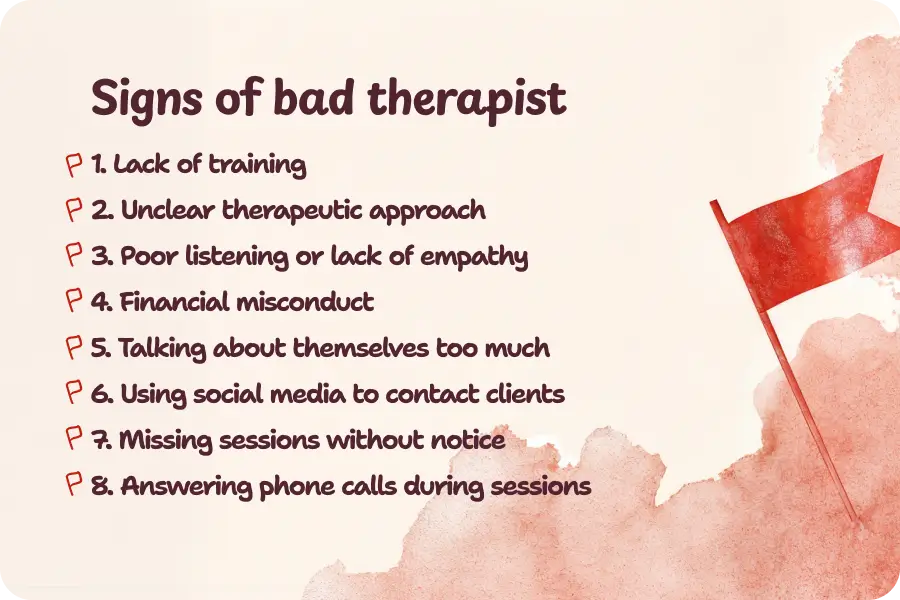You started seeing a mental health professional some time ago and now feel that something is going wrong. Maybe sessions feel unsafe or unproductive, or you don’t notice any meaningful progress. At first, you thought that this was how the therapeutic process was built. But now you’re wondering whether your therapist is crossing a line.
In this article, we’ll explain what defines an unethical therapist. You’ll learn to recognize the signs of a bad therapist from the very beginning and will find out how to choose a mental health provider who can really help you.
What are therapist red flags?
Therapist red flags are behaviors that signal a potential violation of ethical, professional, or safety standards in the therapeutic relationship. These can include abusive behavior, setting an incorrect diagnosis, sharing confidential information, judging a client, etc.
A single bad session can be unproductive due to miscommunication or a temporary lack of connection. However, when a client doesn’t see noticeable results for a long time or feels worse than before, it may highlight the therapist’s lack of professionalism, insufficient skills, or limited empathy. The therapeutic approach can also become problematic when the therapist consistently creates an emotionally unsafe environment.
There are basic things that are non-negotiable for any professional mental health provider. They include maintaining appropriate licensure, upholding confidentiality, and showing empathy. If any of these elements are absent, the therapeutic approach loses its foundation and becomes unsafe.
Why recognizing red flags in a professional relationship matters
Recognizing warning signs as soon as possible helps avoid situations when therapy is unproductive or harmful. You need to identify red flags early to:
- Ensure that therapy is a safe space. If you feel uncomfortable when communicating with a therapist, it can prevent you from opening up. Healing is impossible without trust and emotional connection with the professional who guides you through the process.
- Avoid wasting time and money. An unprofessional therapist will simply waste your time and resources, and you won’t reach your goal to feel better. Noticing that something goes wrong from the first session can help you choose another person to address your mental health concerns.
- Avoid ethical and boundary violations. A “bad therapist” might share confidential info, neglect your boundaries, or exploit their position, which can harm your sense of trust. Noticing red flags from the very beginning allows you to choose a more supportive professional.
- Protect your well-being. Your healing process can have ups and downs, but in general, it should help you gain emotional stability. Recognizing that you constantly feel drained and dismissed means that it’s time to look for another specialist.
8 signs of a bad therapist
A lack of professionalism and ethics can make sessions much less effective. Here are the signs and behaviors in a potential therapist that may hinder your progress in therapy:
1. Lack of training
A therapist practicing independently should have appropriate education and an active license to practice, such as:
- LPC (Licensed Professional Counselor)
- LMFT (Licensed Marriage and Family Therapist)
- LCSW (Licensed Clinical Social Worker)
- LMHC (Licensed Mental Health Counselor)
- LPCC (Licensed Professional Clinical Counselor)
- LCSW-C (Licensed Certified Social Worker-Clinical)
- LP (Licensed Psychologist), etc.
There are also interns and associate therapists who are receiving hours toward licensure under a supervisor.
Yet, having a license isn’t equal to high-quality therapy. A counselor may lack skills if they:
- Provide inconsistent advice.
- Find it challenging to apply evidence-based techniques.
- Lack of structure in sessions and jumping between topics.
Here’s a comment from a Reddit user who shares a personal experience of what can feel like a sign of unprofessionalism. “They (therapists) don’t track evidence of progress, or they don’t show you convincing evidence of progress… If they don’t have any information on when you can see progress, or concrete examples of what progress looks like, that’s a bad sign.”
2. Unclear therapeutic approach
It’s important that the provider can communicate how and why they’re offering certain approaches. If a specialist knows what they’re doing but can’t explain their goal and expected outcomes to the client (even if you ask them about it), it can be a warning sign.
For instance, they may ask you to write down your negative thoughts every day without clarifying how it will help you challenge unhelpful thinking patterns. They might also overlook discussing your insights from the exercise until you bring them up.
3. Poor listening or lack of empathy
Another sign of a ‘bad therapist’ is that a person simply doesn’t listen to you. They may respond with comments like “Hmm” or “Interesting,” but you don’t feel that the therapist is involved in your stories. Or, they might jump to conclusions or assume they know how you feel in a given situation. Moreover, their questions or your answers don’t influence the therapeutic process. It may look like you’re talking to your friend who doesn’t even genuinely want to help you. Such behavior can be a clear sign of an unestablished therapeutic alliance.
Some therapists may listen but lack empathy to support you in most emotional moments. They might seem cold or distant, and even when you truly need support, they may be unable to provide it in a therapeutic way.
4. Financial misconduct
A “good therapist,” on the other hand, is transparent about their payment policies. Some signs that you may need to look for another professional might include:
- Telling about changes in pricing after the fact.
- Adding fees without your informed consent.
- Pressuring clients to buy their books, seminars, or webinars because “without them, treatment isn’t possible.”
- Encouraging frequent sessions that aren’t justified by your treatment plan.
- Committing insurance fraud
Expert Insight
“It’s important to know that most therapists have a cancellation policy. You may be charged for late or missed sessions if you do not provide enough notice. This information is outlined in the informed consent policy. If you have any questions, a good, competent therapist will be happy to answer them.”
Nicole Arzt
Mental health professional
5. Talking about themselves more than about the client
The therapist’s role is to provide guidance and support on your healing journey. And when a specialist talks a lot about their own life, rather than yours, it may interfere with effective treatment.
They might share a story to inspire you to deal with a certain situation. But when it turns into frequent and unrelated personal advice and anecdotes, it can undermine your focus on improving your mental health.
6. Using social media to contact clients
A good therapist shouldn’t monitor your life online. They focus on what you’ve talked about during therapy sessions and shouldn’t use your social media to interpret your behavior. It goes against ethical norms when a therapist follows your personal page or even encourages you to discuss something you’ve posted about lately.
7. Missing sessions without notice
Missing sessions without a clear reason is considered inappropriate for a professional relationship, and therapy isn’t an exception. When a specialist doesn’t show up or cancels sessions at the last minute without a serious reason, it might signal that they don’t value your time. It could also mean they have a lot going on in their own life, which may impact treatment progress.
8. Answering phone calls during sessions
Getting distracted during sessions, whether by phone calls, messages, or unexpected deliveries, may also show a lack of professionalism. Of course, if something extraordinary and urgent happens, a therapist may need to take a brief distraction. However, if it happens regularly, it may indicate a violation of therapeutic rules.
“How should a professional therapist behave in a situation where a session is over and they need to prepare to meet another client, but the present client is crying or feels completely overwhelmed?” Nicole Arzt, LMFT, answers, “Therapists are responsible for monitoring time appropriately. This means helping you center and ground before the session time ends. In some cases, you may ‘go over’ time, but this is the exception and not the rule. You may leave still feeling upset or angry, but any good therapist will help you maintain a sense of regulation as you wrap things up.”

Who is a toxic therapist?
A toxic therapist is someone whose behavior may be hurtful and undermine the client’s sense of emotional safety. In contrast to a bad therapist, a toxic specialist crosses boundaries intentionally, may be manipulative, or violates professional norms, so after the end of the therapeutic relationship, the client can feel even worse than before starting it.
According to the American Psychological Association’s (APA) Ethical Principles of Psychologists and Code of Conduct, therapists are required to maintain professionalism, respect boundaries, and prioritize client welfare above personal interests.
Therefore, if you experience some kind of therapist abuse, you can always report the violation to a licensing board or professional organization.
Have you ever met unprofessional therapists?
6 toxic therapist behaviors to look out for
The main red flags of a toxic therapist are violating boundaries, neglecting clients’ emotions, sharing confidential information, and encouraging dependency.
1. Sharing confidential info publicly
If the therapist shares your story with a family member or a friend or posts something about your situation on social media, this is a violation of confidentiality. Any licensed professional counselor should guarantee that your information, insights, and personal story are strictly confidential.
They are not entitled to share anything you talk about during sessions with anyone else, with only rare exceptions outlined by law. These may include:
- Situations that involve grave, acute danger to the client’s safety or the safety of others.
- Suspected abuse of a child or other dependent adult.
- Getting a court order to disclose specific information.
- When a client provided written consent to share a personal story or its parts.
- To ensure coordinated treatment with other specialists (only after receiving consent from a client).
2. Making unwanted physical contact
The therapeutic alliance should always remain professional. Any physical contact should only happen with a client’s consent and when it is clinically appropriate. Many therapists avoid making any contact at all, but if you work with the one who initiates touch without your permission, it is a serious violation of your safety.
3. Overstepping professional boundaries
Trying to become friends or lovers with a client is another huge red flag in a therapeutic relationship. If your therapist invites you for coffee or suggests going out together, it indicates that you need to look for another specialist. Being friendly during sessions is normal, as it helps build an emotional bond, but crossing into personal life isn’t appropriate.
4. Judgmental or critical attitude
During therapy, a client can share personal stories related to childhood trauma, painful memories, or deep emotions. A therapist should remain empathetic and supportive, regardless of the topic discussed. If a therapist reacts with negative comments or offers tips solely based on personal experience, it can undermine trust and a sense of safety.
5. Power imbalance and control
Before starting therapy, remember that you collaborate with a mental health professional to gain insights into your current state and reach better emotional balance. They aren’t your guide, leader, or authority figure. You’re both partners who work toward a common goal.
When a therapist uses their position to manipulate you, it can prevent you from making progress. This is how one Reddit user describes their experience with a toxic therapist:
“My last therapist was awful and left me with a lot of emotional scars. I made the mistake of telling her that I was afraid of being hospitalized, and she weaponized that fear, threatening me with hospitalization anytime I was suicidal or agitated. She would tell me she would have me “locked up if I didn’t behave.”
6. Shaming your feelings or your condition
A good therapist avoids making you feel guilty or ashamed. Whether you live with any kind of mental health condition, deal with painful experiences, or want to overcome today’s insecurities, a professional would always support you.
Try Breeze to track how you feel in between sessions and notice the overall dynamic. An advanced mood tracker will help you understand whether the treatment process is effective and see improvements in your emotional state.

What to do if you notice therapist red flags
If you notice therapist red flags, you may need to discuss your worries openly or even consider changing the specialist. This is how to handle this situation step-by-step.
1. Remember that all human beings can make mistakes
Therapists can feel worn out and have their own problems and needs. While it is unprofessional to show disregard for clients, an occasional mistake shouldn’t be alarming.
A therapist might, for example, overlook a minor detail from a previous session. They may also misremember scheduling time (and it can be fine if it happens once in a few years). Check to see if it was an isolated incident or a recurring problem before considering moving to a different specialist.
2. Discuss the challenge
If you feel comfortable and safe, you may want to discuss your worries with a therapist. A professional will help you open up and will want to validate your concerns. After it, you’ll be able to come to a common decision on whether you want to continue therapy or need to look for another specialist.
This step won’t work for everyone and every situation, so if you feel neglected or abused by a therapist, you may decide to stop treatment without any discussion. It can also work, but talking about it with another specialist can help you process the experience.
3. Report unprofessional actions
You may also consider reporting to a state licensing board or professional organization about your ex-therapist’s behavior. In this case, it’s better to document dates, specific actions, and how they affected you as clearly as possible. This can help the board evaluate the situation and determine next steps.
How to find the right therapist to take care of your mental health
To find a good specialist for personal or couples therapy, you may need to take a few steps:
- Check their license and diplomas. One of the basics of a good therapist is to be competent and responsible for the client and self, as well as seek proper informed consent and assent. [1] You can directly ask a specialist about their education and certifications, because a trustworthy therapist will be transparent.
- Discuss your needs. Briefly describe what challenges you want to overcome. Therapists have different specializations and use different approaches, and some of them may be a poor fit for your situation. So, it’s better to clarify it from the very beginning.
- Ask for reviews from other clients. Specialists are unable to solicit or share them due to privacy concerns, but you can often find feedback on independent platforms. Positive reviews would be a great benefit.
- Try the first session. Research has shown that a strong therapeutic alliance is one of the most important predictors of positive treatment outcomes. [2] During the first session, you may not feel an emotional connection with the therapist. However, it’s necessary that you trust this person and be ready to open up.
- Notice your emotions during the following sessions. Some behaviors may not show up during the first session but can influence your treatment further. For instance, if the therapist’s attachment style is insecure, it might unconsciously trigger or reinforce the client’s defenses. [3] If you see that something goes wrong, it’s worth discussing it or looking for another specialist.
Final thoughts
Working with a professional therapist can make your life more fulfilling. For that, it’s essential to find the right specialist who can support you and provide guidance.
If you’re only looking for such a professional, Breeze can become a helpful tool on your healing journey. It provides an advanced mood tracker, self-discovery tests, journaling options, custom routines, and relaxation games for you to feel better daily. Try using it regularly for at least a few weeks, and you’ll see the first noticeable changes in your well-being.
Frequently asked questions
How do I know if therapy isn’t helping?
A therapy likely isn’t helpful if you constantly feel worse after sessions, don’t notice any progress, don’t learn any coping skills, and lack understanding of what you can do to feel better. If the contact with a therapist makes you anxious or drained (even if you don’t talk about something overwhelming), it isn’t a worrying sign.
Should I tell my therapist I want to switch?
A good therapist will understand your desire to switch to another specialist regardless of the reason. You should be clear and honest about your feelings, but no additional preparation is needed. If you feel that a therapist may react negatively to your desire to find a better match, it is another sign that you may consider a different specialist.
What is the “two-year rule” in therapy?
A “two-year rule” in therapy means that a therapist isn’t allowed to build a friendly, romantic, or sexual relationship with a former client for 2 years after the end of therapy. This guarantees that a specialist won’t exploit specific knowledge or an emotional connection with the person to take advantage of their vulnerability. However, in most cases, it’s inappropriate to have any personal relationship with a therapist after treatment concludes — it doesn’t matter how many years have passed.
What does it mean if a therapist lacks empathy?
A therapist lacks empathy if they dismiss or ignore your feelings. The person may also be empathetic but lack the professionalism to show this empathy correctly. A good therapist should be supportive, actively listen, and help you feel understood without judgment.
Sources
- Avasthi A, Grover S, Nischal A. “Ethical and Legal Issues in Psychotherapy. Indian J Psychiatry.” 2022
- Stubbe DE. “The Therapeutic Alliance: The Fundamental Element of Psychotherapy.” Focus (Am Psychiatr Publ). 2018
- Marmarosh, Cheri & Kivlighan, Dennis & Bieri, Kathryn & Schutt, Jean & Barone, Carrie & Choi, Jaehwa. (2014). “The Insecure Psychotherapy Base: Using Client and Therapist Attachment Styles to Understand the Early Alliance.” Psychotherapy.
Disclaimer
This article is for general informative and self-discovery purposes only. It should not replace expert guidance from professionals.
Any action you take in response to the information in this article, whether directly or indirectly, is solely your responsibility and is done at your own risk. Breeze content team and its mental health experts disclaim any liability, loss, or risk, personal, professional, or otherwise, which may result from the use and/or application of any content.
Always consult your doctor or other certified health practitioner with any medical questions or concerns
Breeze articles exclusively cite trusted sources, such as academic research institutions and medical associations, including research and studies from PubMed, ResearchGate, or similar databases. Examine our subject-matter editors and editorial process to see how we verify facts and maintain the accuracy, reliability, and trustworthiness of our material.
Was this article helpful?






